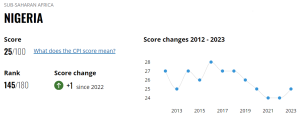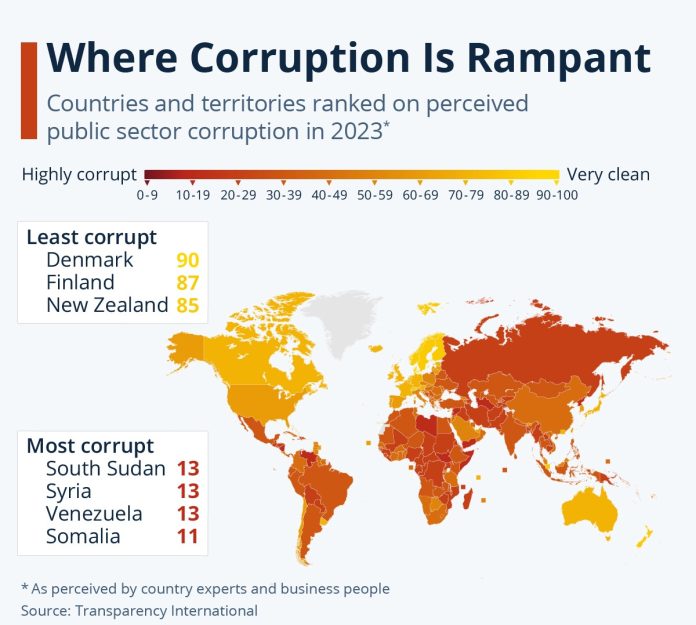Transparency International has released its 2023 Corruption Perceptions Index which gauges levels of perceived public sector corruption in 180 countries and territories around the world.
The index scores them on a scale of zero (highly corrupt) to 100 (clean), with the average score just 43 out of 100.
More than two thirds of countries scored lower than 50, as the majority of countries have made “no progress or declined in the last decade.”
 In 2023, the countries with the lowest perceived level of public sector corruption were Denmark, Finland and New Zealand, followed by Norway, Singapore and Sweden.
In 2023, the countries with the lowest perceived level of public sector corruption were Denmark, Finland and New Zealand, followed by Norway, Singapore and Sweden.
The opposite end of the index saw Somalia scoring just 11, making it the world’s most corruption-stricken country. Syria, Venezuela and South Sudan were close behind with a score of 13.
Countries with strong rule of law and well-functioning democratic institutions often sit at the top of the index. Democratic countries tend to greatly outperform authoritarian regimes when controlling corruption – full democracies have a CPI average of 73, flawed democracies have one of 48 and non-democratic regimes just 32.
Sub-Saharan African region is the lowest scoring with 33/100.
Nigeria’s corruption rating
Speaking during the official launch of the CPI in Abuja on Tuesday [today], the Executive Director of the Civil Society Legislative Advocacy Centre, Ibrahim Musa Rafsanjani, said the scores show that Nigeria still has a lot of work to do at the national and regional levels; noting that the country’s score is below the Sub-Saharan African average of 33 points.
political corruption is on the increase. When you loot the nation and you are rewarded with appointment, you will continue to do business as usual
“The index reveals that Nigeria scored 25 out of 100 points in the 2023 Corruption Perception Index, compared to 24 points in the year 2022 CPI; while Nigeria ranks 145th out of 180 countries, compared to 150 on 2022 CPI results.
“Nigeria’s score is below the sub-Saharan African average of 33 points. Most African countries show stagnation, 90 per cent of countries in Sub-Saharan Africa scored under 50.
“This shows that it is a problem that we have both in the country and at the regional level and that we have to wake up to ensure that we do everything possible to defeat corruption and corrupt practices.
“You can see many reasons why these are happening, political corruption is on the increase, and when you loot the nation, and you are rewarded with the appointment, you will continue to do business as usual. So, at both national and regional levels, we have a lot of work to do to create a conducive atmosphere where development can thrive, and where democracy and electoral transparency can happen”, he said.
Continuous corruption and wasteful expenditure in the security sector are likely to determine the success or failure of the development objectives of this administration
Highlighting the weaknesses and the reasons why Nigeria’s position had scarcely changed, the Country Director of Accountability Lab Nigeria, Friday Odeh, cited judicial and electoral corruption, as well as corruption in the security sector, as some of the key weaknesses that the country needs to improve on.
“First, we have electoral corruption, which I think most of us are aware of. It is no longer news that the 2023 election dashed the hope of Nigerians, most especially those of the young population who were excited to come out to vote in 2023.
“But now we are not sure what will happen in the next elections. Still referencing the 2023 elections, the Nigerian Judiciary was expected to display independence and dispatch justice transparently, as well as in equity and fairness. However, different conflicting rulings by the different courts, have questioned the independence and integrity of the judiciary as an institution.
“The third weakness is the corruption in the security sector. The defence and security sector has accounted for 13.4% of the national budget. Over the years security budget has been the highest, if not the last three years across the years, which is about twice the sum of the next two sectors, talking about education which is 8.2% and infrastructure which is 5.7%.
“The primary aim of the government is to protect the life and property of citizens, we no longer know if that is the priority. Continuous corruption and wasteful expenditure in the security sector are likely to determine the success or failure of the development objectives of this new administration”, he stated.
The Index was aggregated from eight different sources including the Bertelsmann Foundation Transformation Index, Economist Intelligence Unit Country Ratings, Global Insights Country Risk Ratings, PRS International Country Risk Guide, Varieties of Democracy Project, World Bank Country Policy and Institutional Assessment, World Economic Forum Executive Opinion Survey as well as World Justice Project Rule of Law Index.


